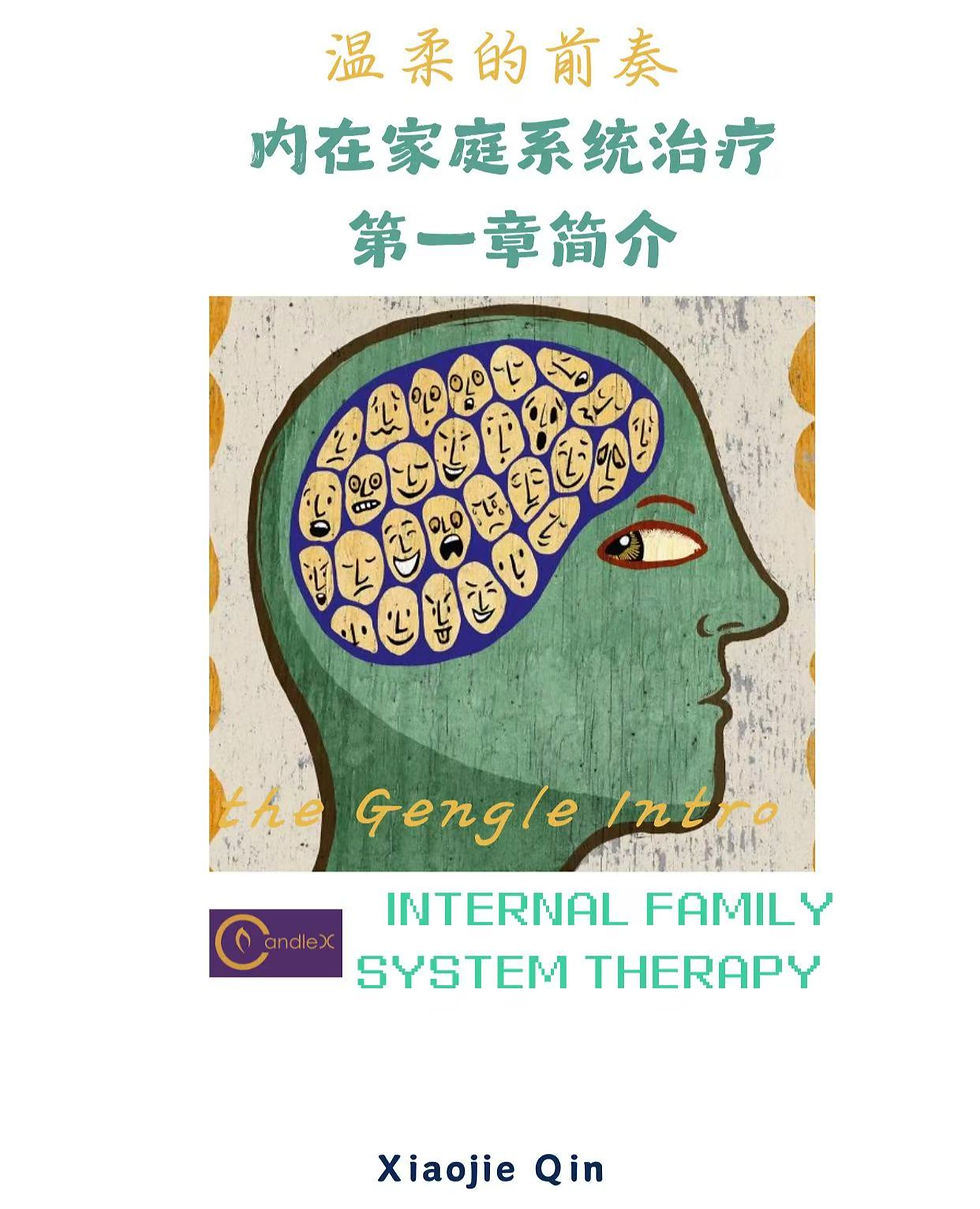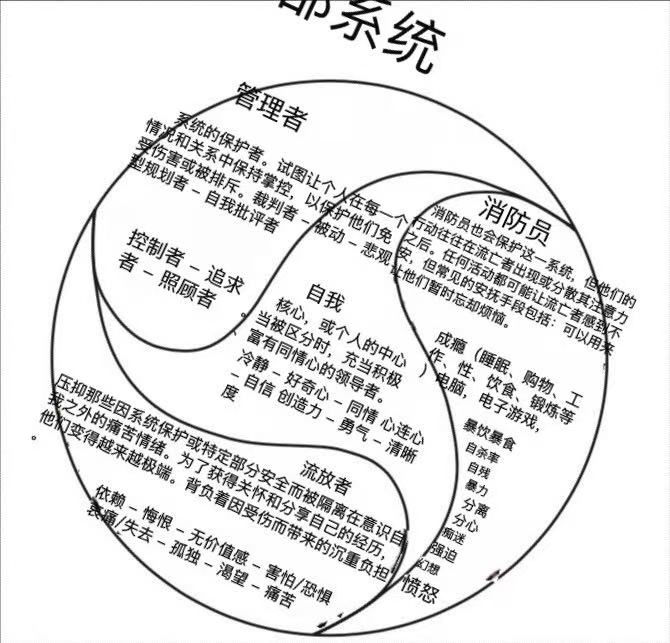The Gentle Intro | Internal Family System Therapy (1)
- candleXJ
- Aug 16, 2025
- 6 min read

Author 作者: Xiaojie Qin 秦小杰
2025/08 Beijing
Intro: The First Chord – When All My Parts Were Acknowledged
Wow, this song came out in 2006. It’s been two decades since I first fell in love with India Arie’s The Wings of Forgiveness.
I had found that the art of simplicity.
Simply means making peace with your complexity
As a young adult first dipping my toes into life’s deeper waters, these lyrics struck a chord. I couldn’t quite articulate why they resonated—only that they mirrored a truth I sensed but hadn’t named: that we’re never just ‘good’ or ‘bad,’ like the pass/fail simplicity of school grades. Hmm… complicated. We’re woven from layers, contradictions—what I’d later come to know as parts. And unlike school’s harsh judgments, these parts don’t need to be banished. We can learn to sit with them, even the messy ones.
This idea of complexity acknowledges every facet of life and ourselves. It’s what I’ve spent my adult life learning to embrace and coordinate, rather than reject with fear or hatred.
As a therapist expanding my toolbox, I stumbled upon Internal Family Systems (IFS). That same chord resonated again—that familiar feeling of gentle, tolerant embrace. I dove into learning and practicing it without hesitation. I know this ‘love at first sight’ well, whether with swing dance, Brazilian jiujitsu, or now, IFS.
Let me try to explain it simply:
IFS Therapy was developed by Dr. Richard Schwartz in the 1980s. IFS views a person as a system of parts—each with distinct roles and desires, yet all ultimately serving the person’s best interest. In mentally healthy individuals, these parts collaborate harmoniously. But trauma can leave parts wounded or burdened, causing dysfunction: parts may fight each other, overcompensate, or shut down. This internal conflict can manifest as emotional struggles, physical symptoms, or even mental health conditions as extreme as dissociative identity disorder.
前奏:第一个和弦——当所有"部分"被看见时
天,这首歌居然是2006年发行的。曾几何时,我很喜欢听India Arie的歌曲,很多并不是情歌,而是对生活的反思和描述,我一直非常爱的《The Wings of Forgiveness (宽恕之翼)》这首歌,居然已经离发行日期过去近二十年了。
I had found that the art of simplicity 我发现简单的艺术
Simply means making peace with your complexity 就是与你的复杂和解
当年刚接触这首歌的我,还是个黄毛丫头 (当然好像确实也染了褐色的头发,太巧了),这句歌词像拨动了我某根心弦。说不上为什么被打动,只觉得它映照了我说不清的直觉:学校去评价我们是用及格与否的二元思维来衡量我们,但也许我们每个人都有不同的维度组成,很湿复杂。我们由层层不同的特点组成,有时还会相互矛盾——后来我尝试着用'部分'这个次去拆解难以表达的自我。和学校的粗暴评判不同,也和家长希望的改造不同,部分无需被驱逐,每一个不‘部分’都必不可少,而我们可以学着让它们共处,哪怕是那些乱糟糟的部分。
这种对复杂的认知,成了我成年后一直在学习的课题:不是用恐惧或厌恶去拒绝,而是接纳并协调生命的每个棱面。
当我作为心理咨询师拓展技能时,我接触了很多不同的咨询流派。而当我去认识'内在家庭系统疗法'(IFS)时,当我听到‘部分’这个概念,那根心弦再次被拨动——那种熟悉的、温柔包容的共鸣感。我毫不犹豫地投身学习和实践。这种'一见钟情'我很熟悉,二十几岁时的站在舞池里第一次跳摇摆舞、三十几岁时在地垫上被人压的起不来的第一节巴西柔术课。
我简单介绍下内在家庭系统疗法'(IFS)吧:内部家庭系统疗法(IFS)由理查德·施瓦茨博士于20世纪80年代创立。IFS把一个人看作由不同'部分'组成的系统,每个部分都有独特需求和功能,本质上都在保护你。部分协作顺畅时,你的心理趋于健康;但生活中,难免有创伤,这些遭遇会让某些部分受伤或不堪重负,导致它们互相打架、过度补偿或彻底罢工。这种内战可能表现为情绪问题、身体症状,甚至解离性身份障碍这样的严重问题。

Head: Fractured Harmony – Every Voice Has a Story
If life’s a song, we are all singers.
We sometimes sing off-key or lose the beat—
a therapist’s role is to hear each voice’s solo,
and help you harmonize the chaos,
until every part finds its pitch.
(Fun fact—this musical metaphor became real to me thanks to my music mentor Feng dawei this year, who taught me what it truly means to be "off-key" and "in harmony." Unrelated to therapy, yet profoundly connected.)
“Internal Family Systems—is this family therapy?" The answer’s no. Family here means the unshakable bonds between all internal parts of an individual: the Managers, Exiles, Firefighters, and crucially, the Self—each an indispensable member of your psyche’s household.

IFS’s naming (and whole approach) is unapologetically right-brain: poetic, ‘less scientific,’ but that’s precisely what disarms resistance with gray-area flexibility. Compare this to Cognitive Behavior Therapy (for more info, check out ‘Xiaojie on Cognitive Behavior Therapy: A Therapist's Honest Take’), which stamps clinical terms like Cognitions and Behaviors right in its name, CBT’s structured lists (cognitive distortions! positive/negative behaviors!) ironically mirror the black-and-white thinking that is famously on its distortion list.
Meanwhile, IFS whispers: "What if all your parts—even the ‘problem’ ones—are just trying to help?" That right there—the attitude, or qualities (what ACT would call values)—points to IFS’s Self: the 8Cs and 5Ps.

主歌:破碎的和声——你的每个声音,都有来处
若人生如歌,你我皆是歌者。
我们难免走调失拍,而治疗师的工作,便是听懂每个声部的独奏,
帮你在混沌中和声,让每个声音回归自己的音准。
(说来有趣——这个音乐比喻的实现,要特别感谢我今年的音乐良师益友,才华横溢的冯大维,是他让我真正理解了什么是"走调"与"和声"。这与心理治疗无关,却奇妙地相通。)
“内在家庭系统疗法(IFS)——这是家庭治疗吗?”答案是否定的。这里的"家庭"指的是个体内部所有部分之间不可撼动的联结:管理者(Managers)、放逐者(Exiles)、消防员(Firefighters),以及最关键的"真我(Self)"——它们都是你心灵家园中不可或缺的成员。

IFS的命名(及其整体方法)毫不掩饰地偏向右脑思维:充满诗意、"不那么科学",但正是这种灰色地带的灵活性消解了人们的心理防御。相比之下,认知行为疗法(CBT,参见我的另一篇文章: 认知行为治疗|心理咨询师小杰的坦白局)直接把"认知"和"行为"这类临床术语嵌在名称里——颇具讽刺意味的是,它那些结构化清单(认知扭曲!积极/消极行为!)恰恰在某种程度上复刻了其经典扭曲清单中最典型的"非黑即白"思维模式。
与此同时,IFS却轻声问道:"如果你所有的内在部分——包括那些'问题成员'——都只是想帮你呢?"这种态度或特质(ACT疗法称之为"价值观")恰恰指向了IFS的核心——"真我"(Self)的八大特质(8C)和五大品质(5P)。

The Next Song: My Client Rose and the Healing Process
With Rose's generous permission (name changed for confidentiality), I'll share our real therapeutic journey—how IFS helped us navigate a moment of therapeutic impasse and create transformative change. When I reconnected with her to request consent, I learned something beautiful: A full year after our sessions ended, Rose continues working with parts on her own through reading, discovering new layers of healing and growth.
下一首歌:我的来访者蕊芬
蕊芬(化名)于2023年底开始与我进行心理咨询。衷心感谢她允许我分享我们咨询过程中的关键片段——当我们的工作遇到瓶颈时,正是IFS的"部分"(Parts)理念和技术帮助我们突破了困境。最近因文稿需要与她联系确认时,我很欣喜地得知:她现在生活得很好,并且一直在自主研读"部分"心理学相关书籍,这些知识至今仍在滋养着她的成长。

Disclaimer:
I wrote this article in English. I used Deepseek to translate my writing from English to Chinese as a draft, which I use to finalize the Chinese version of my article.
I worked with Deepseek for one purpose of editorial role: to refine this article - improving grammar, clarifying ideas, and smoothing the flow - while carefully preserving my personal voice, therapeutic perspective, and original intent. All therapeutic insights and opinions remain my own.
特别声明:
1. 我用英文写作该文章,然后由Deepseek完成英文至中文的文本初步翻译,我在此基础上完成中文编辑写作。
2. 这篇文章在撰写过程中,使用了Deepseek,仅限于编辑润色:对文章进行语法优化、观点澄清及行文流畅性调整,但严格保留我的个人风格、专业理念与核心观点。所有心理咨询见解与立场均出自本人


Comments